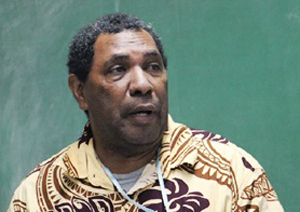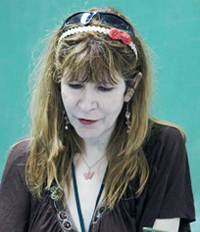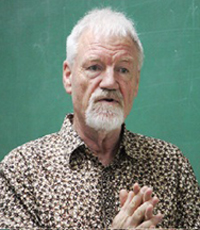
SUVA (Pacific Media Watch / University of the South Pacific News): Members of the University of the South Pacific community have been treated to a series of discussions on regional issues at the 12th Pacific Science Inter-Congress (PSIC) hosted by the university.
A panel of Pacific media commentators met on Wednesday to discuss the significant impact of journalists in the awareness and distribution of information relating to environmental issues, especially climate change. USP lecturer Dr Sky Marsen did a comparative analysis of articles from Fiji newspapers and those from New Zealand, and found that coverage of a global event did not have a significant impact on local reporting on environmental issues.
USP lecturer Dr Sky Marsen did a comparative analysis of articles from Fiji newspapers and those from New Zealand, and found that coverage of a global event did not have a significant impact on local reporting on environmental issues.
A USP journalism academic who is currently pursuing his doctoral thesis, Nash Sorariba, talked about the media’s role in the reporting of environmental issues, leading to grave topics of concern, such as corruption, in Papua New Guinea.
“It is important to identify how the media reports on issues, because when discussing about environmental degradation, as is the gist of my thesis, you get to uncover many underlying issues. Land problems could indicate the depth of corruption, and this has been seen in many of the case study analyses that have been carried out in PNG,” Sorariba said. Professor David Robie, director of the Pacific Media Centre at Auckland University of Technology, who was also on the panel, expressed his delight at being back in Fiji as part of the conference.
Professor David Robie, director of the Pacific Media Centre at Auckland University of Technology, who was also on the panel, expressed his delight at being back in Fiji as part of the conference.
"Climate change is the most urgent and vital geopolitical story of our times and the urgency is already apparent in the Pacific," he said.
"Yet most news media treat this issue as just another 'journalism round' on a par with health reporting, crime or education, for example.
"Some news organisations, particularly in Australia and the US, even give prominence to climate change deniers or sceptics – claiming they are providing 'balance'."
Professor Robie, who has also been a former head of journalism at USP, said he had just returned from a global conference in Indonesia where most media advocates, journalists and educators were calling for a "new media morality".
According to Dr Robie, citing Malaysian author and analyst Saik Yoon Chin, journalists would be facing perhaps an “impossible mission” in the near future.
This is what they would face:
• Countering past messages about unfettered “growth”
• Promoting less consumption
• Working on very long time scales – not current short-term self-interested politicians’ time scales
• Altruism now for future generations
• Advocating against “old vested interests”
• Managing conflicts – examples of peace journalism
• Nurturing hope in the community
"Journalists need to be able to offer some contributions to future generations," Dr Robie said, "not just stand on the sidelines and deny all community responsibility."
Many local, regional and international academics and scholars have presented at the 12th PSIC, which was a platform for discussion and debate about possible methods for the Pacific in attaining human security and sustainable development.
David Robie on the conference at Cafe Pacific
This work is licensed under a Creative Commons Attribution-NonCommercial 3.0 New Zealand Licence.




